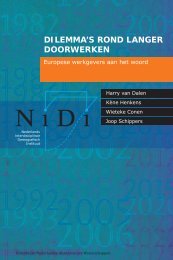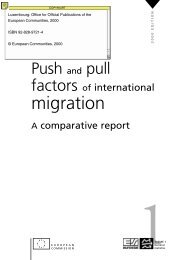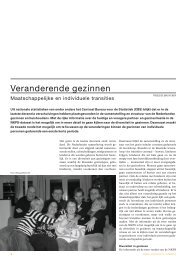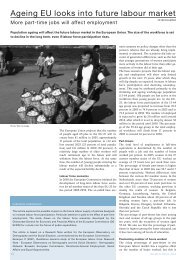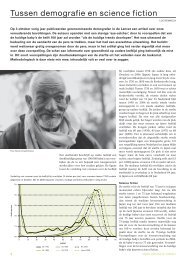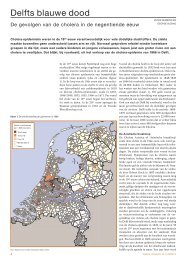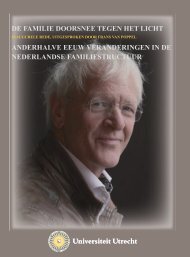Frans van Poppel: a sort of farewell. Liber Amicorum. - NIDI
Frans van Poppel: a sort of farewell. Liber Amicorum. - NIDI
Frans van Poppel: a sort of farewell. Liber Amicorum. - NIDI
- No tags were found...
You also want an ePaper? Increase the reach of your titles
YUMPU automatically turns print PDFs into web optimized ePapers that Google loves.
<strong>of</strong> further aspects <strong>of</strong> marriage, divorce and fertility. Let me just mention the questions <strong>of</strong> theseasonality <strong>of</strong> marriage, the remarriage <strong>of</strong> widowers, the effects <strong>of</strong> changes in legislation ondivorce, <strong>of</strong> the role <strong>of</strong> health selection in the marital transition, <strong>of</strong> the behaviour <strong>of</strong> widowersin a small city, <strong>of</strong> changes in the proper age <strong>of</strong> marriage, in the degree <strong>of</strong> homogamy and <strong>of</strong>the problems encountered when trying to overcome the death <strong>of</strong> one <strong>of</strong> the marrriage partners.It is a rich display <strong>of</strong> topics and interests and the collaboraters tend to change with the issue.If one consults an international database on mortality, chances are that one finds a note thatthe data on the Netherlands have been supplied by <strong>Frans</strong> <strong>van</strong> <strong>Poppel</strong>. And indeed, togetherwith several others <strong>Frans</strong> has done his utmost to try and construct cohort and period life tablesfrom the earliest possible date. I have always found the two estimates <strong>of</strong> life expectancyat birth for the first half <strong>of</strong> the 19 th century very useful in illustrating the magnitude <strong>of</strong> thechanges in the last decades. For the years 1827-1828 life expectancy at birth in the Netherlandsapparently only reached 36.6 years while for 1840-1851 it may even have been half a yearless. Just as in the case <strong>of</strong> marriage and fertility <strong>Frans</strong> has constantly sought to broaden ourhorizon and to push the boundaries <strong>of</strong> our knowledge further away. One aspect concernsdifferental mortality: How large were the differences between rural and urban areas, betweenthe sexes, between social classes, at different ages, and just after birth or when people hadbecome aged? Investigating the causes <strong>of</strong> death, changes in the state <strong>of</strong> health as self-reportedand the increase in the probability <strong>of</strong> death following the loss <strong>of</strong> a parent or a partner. Therelation between marital status and mortality also received attention, while the survival <strong>of</strong>illegitimate children in comparison to their legitimate counterparts similarly was the subject<strong>of</strong> a study. Again, just as regarding fertility and marriage, <strong>Frans</strong> gave the role <strong>of</strong> religion hisspecial attention. Did it result in differences in infant and childhood mortality? In all <strong>of</strong> thiswork, that in fact one can see grow almost organically under his hands, <strong>Frans</strong> always was onthe alert for the possibility <strong>of</strong> international comparisons and when international programmesin historical demography were being launched the organizers commonly found in <strong>Frans</strong> theirrepresentative for the Netherlands.In all <strong>of</strong> his work <strong>Frans</strong> kept an open eye for the theoretical aspects <strong>of</strong> a study and the largerframework in which the topics selected had to find their place. His extensive knowledge <strong>of</strong>population literature built up over many years <strong>of</strong> reading and acting as a <strong>sort</strong> <strong>of</strong> custodian <strong>of</strong>the <strong>NIDI</strong> library paid <strong>of</strong>f handsomely on such occasions.EpilogueI must admit that with two exceptions, that is when both <strong>of</strong> us were on the <strong>NIDI</strong> staff andwhen <strong>Frans</strong> was the Rogier pr<strong>of</strong>essor at the University <strong>of</strong> Nijmegen, I had no reason to follow<strong>Frans</strong>’s career very closely. From a certain distance I was happy to see that he was doing wellbut we never really collaborated nor wrote a paper together. Why we never did is a moot point.Curiously enough the situation suddenly changed when <strong>Frans</strong> was coming close to retirementand I was about to become an octogenarian. A few years ago Yves de Roo and I were workingon our book on the members <strong>of</strong> the Royal Academy. We then found that calculating their lifeexpectancy was both possible and illuminating in assessing their social position. Two or threeyears later it ocurred to me that one could possibly collect information on the birth and death15





